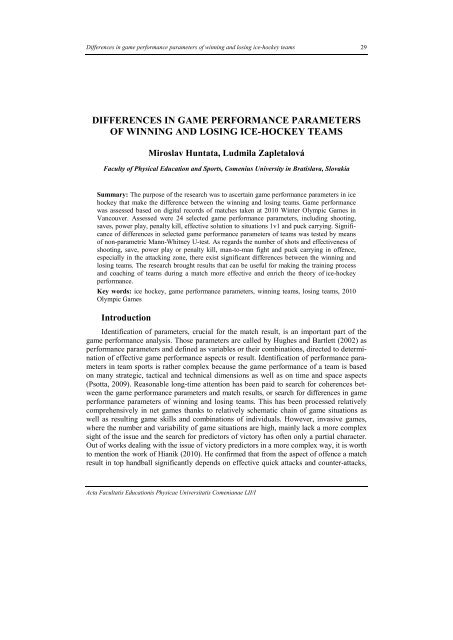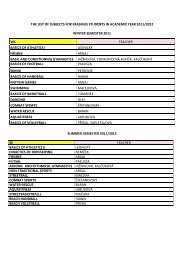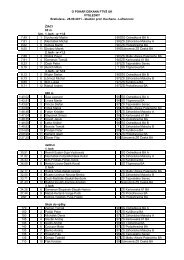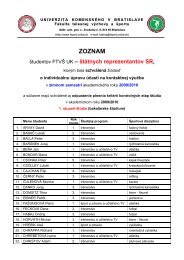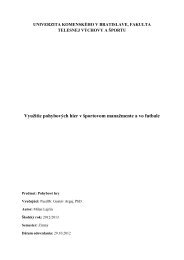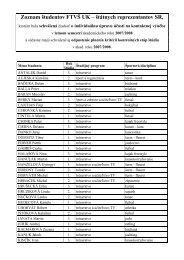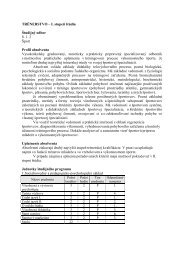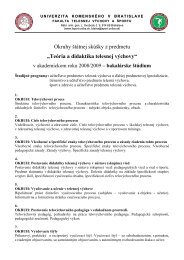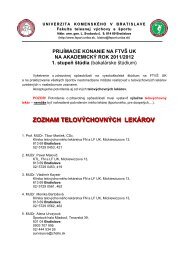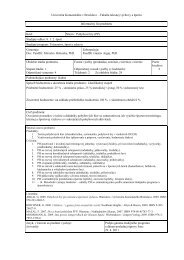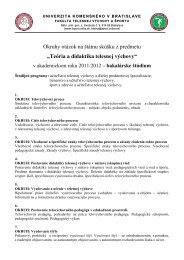acta facultatis educationis physicae universitatis comenianae
acta facultatis educationis physicae universitatis comenianae
acta facultatis educationis physicae universitatis comenianae
Create successful ePaper yourself
Turn your PDF publications into a flip-book with our unique Google optimized e-Paper software.
Differences in game performance parameters of winning and losing ice-hockey teams<br />
29<br />
DIFFERENCES IN GAME PERFORMANCE PARAMETERS<br />
OF WINNING AND LOSING ICE-HOCKEY TEAMS<br />
Miroslav Huntata, Ludmila Zapletalová<br />
Faculty of Physical Education and Sports, Comenius University in Bratislava, Slovakia<br />
Summary: The purpose of the research was to ascertain game performance parameters in ice<br />
hockey that make the difference between the winning and losing teams. Game performance<br />
was assessed based on digital records of matches taken at 2010 Winter Olympic Games in<br />
Vancouver. Assessed were 24 selected game performance parameters, including shooting,<br />
saves, power play, penalty kill, effective solution to situations 1v1 and puck carrying. Significance<br />
of differences in selected game performance parameters of teams was tested by means<br />
of non-parametric Mann-Whitney U-test. As regards the number of shots and effectiveness of<br />
shooting, save, power play or penalty kill, man-to-man fight and puck carrying in offence,<br />
especially in the attacking zone, there exist significant differences between the winning and<br />
losing teams. The research brought results that can be useful for making the training process<br />
and coaching of teams during a match more effective and enrich the theory of ice-hockey<br />
performance.<br />
Key words: ice hockey, game performance parameters, winning teams, losing teams, 2010<br />
Olympic Games<br />
Introduction<br />
Identification of parameters, crucial for the match result, is an important part of the<br />
game performance analysis. Those parameters are called by Hughes and Bartlett (2002) as<br />
performance parameters and defined as variables or their combinations, directed to determination<br />
of effective game performance aspects or result. Identification of performance parameters<br />
in team sports is rather complex because the game performance of a team is based<br />
on many strategic, tactical and technical dimensions as well as on time and space aspects<br />
(Psotta, 2009). Reasonable long-time attention has been paid to search for coherences between<br />
the game performance parameters and match results, or search for differences in game<br />
performance parameters of winning and losing teams. This has been processed relatively<br />
comprehensively in net games thanks to relatively schematic chain of game situations as<br />
well as resulting game skills and combinations of individuals. However, invasive games,<br />
where the number and variability of game situations are high, mainly lack a more complex<br />
sight of the issue and the search for predictors of victory has often only a partial character.<br />
Out of works dealing with the issue of victory predictors in a more complex way, it is worth<br />
to mention the work of Hianik (2010). He confirmed that from the aspect of offence a match<br />
result in top handball significantly depends on effective quick attacks and counter-attacks,<br />
Acta Facultatis Educationis Physicae Universitatis Comenianae LII/I


